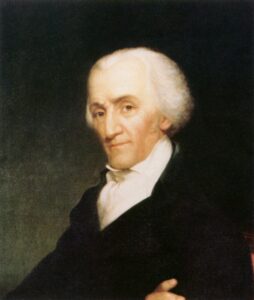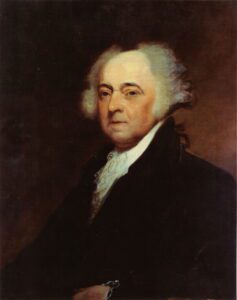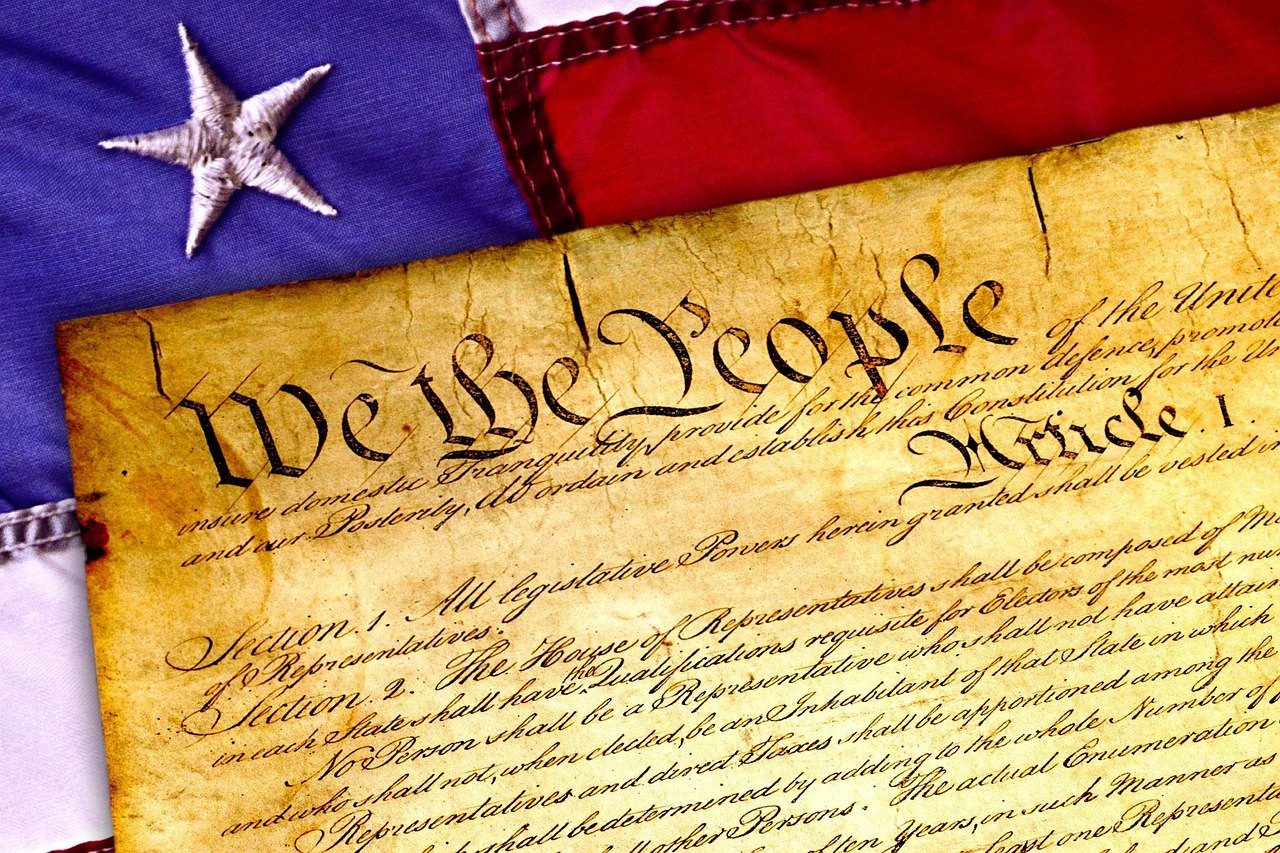
Elbridge Gerry was a wealthy Massachusetts merchant who was involved in early revolutionary politics. He was closely associated with radicals John and Sam Adams and he was an eager signer of the Declaration of Independence and the Articles of Confederation. He was a delegate to the Constitutional Convention but refused to sign the Constitution. Gerry served in many political positions during his life, and the political practice of “gerrymandering” is named after him. Despite this dubious honor, Elbridge Gerry and others pushed the colonies to revolution and then built our country. He was a patriot and an American hero.
Elbridge Gerry was born on 17 July 1744 in Marblehead, Massachusetts. He was one of 12 children of Thomas and Elizabeth Gerry. His father was a wealthy merchant. Little is known about his early life. He entered Harvard College in 1758. When he graduated in 1762, he entered the family business and became a member of a social group that was becoming more political because of Britain’s increasingly heavy-handed imperial policy.
In 1765, Elbridge was advocating evading the Stamp Act. By 1770 he was serving in local political positions and later helped Sam Adams set up committees of correspondence. He became closely allied with John and Sam Adams making up a Bay Colony troika advocating for separation from the Crown.
Gerry became more militantly anti-British as the British increased their efforts to politically control the colonies and enlarged their military presence to enforce political control. He was, however, equally opposed to popular democracy. After mobs destroyed a hospital he had helped establish, he called it “savage mobility” and withdrew from politics.
When the port of Boston was closed by the British in June 1774, Gerry re-entered the political fray as Marblehead became the port of entry for donations from other colonies. He organized the relief effort and tried to prevent profiteering. He was also a leader in the Provincial Congress. He worked with John Hancock to collect military stores and was nearly captured on 18 April 1775 by British soldiers who were EnRoute to Concord.

On 25 January 1776 Gerry was sent to the Continental Congress where he was an early advocate of independence. During the debates John Adams wrote, “If every Man here was Gerry, the Liberties of America would be safe against the Gates of Earth and Hell.” Gerry eagerly signed the Declaration of Independence and later the Articles of Confederation. He considered the national government under the Articles to be “the finishing stroke of our independence.”
In Congress Gerry was a voice for fiscal responsibility, but also took some controversial positions. He was a member of the “Conway Cabal” supporting General Thomas Conway to replace George Washington as Commander of the Continental Army. He opposed the French alliance and in response to a diplomatic spat he supported Arthur Lee against Benjamin Franklin. He believed Franklin had been “corrupted” by his stay in France.
In February 1781, Gerry resigned from Congress in a huff. He charged that his “personal privilege” and “states’ rights” had been infringed upon. He believed in limited government and was concerned about what he saw as a congressional movement to concentrate power in the new government.
Gerry resumed his congressional seat in 1783 and became active in peace negotiations with Britain. Peace was achieved that same year by the Treaty of Paris. After the war Gerry campaigned to abolish the standing army and the Order of Cincinnati which he believed were threats to a republican government. He opposed a strong Federal government but reversed himself after “Shays’ Rebellion” which convinced him the country was on the verge of anarchy.

In September 1785 Gerry again left Congress and the next year married Ann Thompson, the daughter of a wealthy New York merchant. His best man was James Monroe. Ann was 20 years his junior and gave birth to ten children between 1787 and 1801, which seriously compromised her health. In 1787 Gerry bought a large confiscated Tory estate in Cambridge known as Elmwood. This was the Gerry family home for the rest of his life.
Gerry was a delegate to the 1787 Constitutional Convention where he played a leading role. He continued to advocate for limited government and state’s rights. He was a strong proponent of individual liberty by placing checks on government power. He supported the idea that the Senate composition should not be based on population.
Because of his fear of “excessive democracy” Gerry advocated for limits on voting privileges. He believed the people could be easily misled and could not be trusted to select national officials. Conversely, he was fearful of aristocracy demanding annual elections and an enumeration of government powers. He especially wanted a bill of rights.
Since the proposed constitution did not include a bill of rights and strengthened the central government, Gerry and two others (George Mason and Edmund Randolph) refused to sign the constitution.
In Gerry’s home state of Massachusetts, the ratification convention was dominated by Federalists. Although invited to that body, Gerry was not allowed to speak, and he left after a shouting match with the convention chair. Massachusetts ratified the Constitution by a vote of 187 to 168. Gerry was nominated for governor in 1788 but was easily defeated by John Hancock.
Gerry came to accept the Constitution because so many states proposed amending it and he was elected to the first US House of Representatives. Some of our rights are in the Bill of Rights because of Gerry. He was instrumental in inserting the right to “freedom of assembly” in the First Amendment and was the chief architect of the Fourth Amendment protection against “search and seizure.” He was also successful in limiting federal government control of state militias.
Later Alexander Hamilton presented the House with several financial proposals that were vigorously supported by Gerry because they strengthened the economy of the nation. Gerry was often on the floor of the House to oppose “aristocratic and monarchical” tendencies that he saw as a threat to republican ideals or that limited individual or state liberties.
Gerry did not run for re-election in 1792. He returned home to help raise his children and care for his wife who was feeling the effects of giving birth to many children in a short time. He did serve as a presidential elector for John Adams in the 1796 election. Gerry maintained good relations with both President Adams and Vice President Thomas Jefferson.
President Adams appointed Gerry to a diplomatic mission to Republican France in 1797. Tensions had risen between the two nations after the Jay Treaty of 1796 between the US and Britain. The French saw this as an Anglo-American alliance and the French were seizing American merchant ships. Gerry joined Charles Pinckney and John Marshall in France in October.
The delegation met with the French Foreign Minister Talleyrand briefly when Gerry arrived. A few days later three French agents (designated “X,” “Y” and “Z” in publications which resulted in the incident being called the XYZ Affair). The French agents demanded substantial bribes before negotiations could continue. The Americans refused to pay, and negotiations halted.
Talleyrand agreed to meet with Gerry but not the other two American delegates. All three then prepared to leave France, but Talleyrand threatened war if Gerry left. The other two left in April 1798. Gerry remained but refused to negotiate and left in August. The naval Quasi-War (1798-1800) followed.
Gerry was accused by Federalists of supporting the French and causing the breakdown of the talks. Adams and Jefferson supported him, but his reputation was severely damaged. Adams claimed Gerry had opened the door that led to the successful Franco-American Convention of 1800. Personal vindication came later when his correspondence with Talleyrand was published. Because of the Federalist attack on him, Gerry joined the Democratic-Republican party in 1800. Previously he had opposed all political parties.
For years Gerry had tried to win the office of Governor of Massachusetts without success. His opponent had been Caleb Strong a very popular moderate Federalist. He was finally elected in 1810 when Strong did not run and re-elected in 1811. His campaigns were very partisan. He was accused of being a French supporter and he accused his opponent of being a “British Lover.”
His first term was fairly calm, but the second term was very controversial. His party controlled the legislature and Gerry purged the government of political foes. His party also “reformed” the court system by enlarging it and then “packing” the courts.

In 1812 Massachusetts drew-up new constitutionally mandated voting district boundaries. The new districts were highly partisan and designed to enhance his party’s strength. One district in Essex County was compared to a salamander by a Federalist newspaper political cartoon. They called it “Gerry-mander.” To this day drawing partisan districts is called “gerrymandering.”
Gerry lost the 1812 election because of the partisan investigations he had engaged in, the redistricting controversy and the impending War of 1812. He was beaten by his old nemesis Caleb Strong.
Gerry now had severe financial problems because his brother had mismanaged his business and Elbridge bailed him out. He needed an income, so he asked President James Madison for a federal position. Instead of a job, he was selected to be Madison’s vice-presidential running mate in the 1812 election.
Madison and Gerry easily won election and Gerry took the oath at Elmwood in March 1813. The new vice president’s, support of the War of 1812 became very partisan. He used it to accuse the Federalists of being pro-British.

On 23 November 1814, Gerry fell ill and died in his Washington, DC home. He is buried in the Congressional Cemetery in Washington, DC. He is the only signer of the Declaration of Independence to be buried in the capital. His grave is marked with a memorial by John Frazee. The estate he left his wife was land-rich but cash-poor because he had paid his brother’s debts.
Elbridge Gerry was a complex man who is difficult to classify because of his political changes during his long political career. He is primarily remembered for signing the Declaration of Independence, for the use of his name in the word “gerrymander,” for his refusal to sign the Constitution, and for his role in the XYZ Affair, but the man was so much more.
There is no doubt that Gerry’s, and others’, stand on the Constitution resulted in the adoption of the Bill of Rights. He was always an outspoken champion of individual rights when there was still a lot of elitism in American politics. He opposed a standing army because he feared it could be used against the people. Gerry was initially against political parties but eventually joined one. Sadly, he became very partisan in his later years.
The fact is that Gerry, like most people was basically good, but certainly not perfect. He pushed for independence early, loved this country, and always worked to improve it. As far as I know there are no great monuments to Gerry, but he was a patriot and an American hero.
